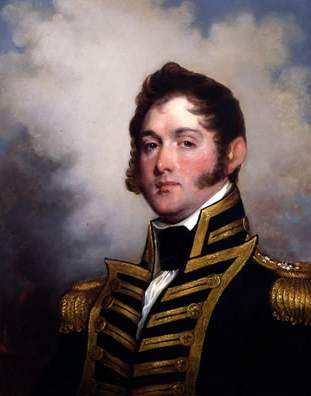Report on the Battle of Lake Erie, from the US Schooner Ariel, Put-In-Bay, (13 September 1813)
Contexto: I made sail, and directed the other vessels to follow, for the purpose of closing with the enemy. Every brace and bowline being soon shot away, she became unmanageable, notwithstanding the great exertions of the sailing master. In this situation, she sustained the action upwards of two hours within canister distance, until every gun was rendered useless, and the greater part of her crew either killed or wounded. Finding she could no longer annoy the enemy, I left her in charge of lieutenant Yarnall, who, I was convinced, from the bravery already displayed by him, would do what would comport with the honour of the flag. At half past two, the wind springing up, captain Elliot was enabled to bring his vessel, the NIAGARA, gallantly into close action. I immediately went on board of her, when he anticipated my wish by volunteering to bring the schooner which had been kept astern by the lightness of the wind, into close action. It was with unspeakable pain that I saw, soon after I got on board the NIAGARA, the flag of the LAWRENCE come down, although I was perfectly sensible that she had been defended to the last, and that to have continued to make a show of resistance would have been a wanton sacrifice of the remains of her brave crew. But the enemy was not able to take possession of her, and circumstances soon permitted her flag again to be hoisted.
Oliver Hazard Perry: Frases em inglês
Report on the Battle of Lake Erie (13 September 1813)
Contexto: Those officers and men who were immediately under my observation, evinced the greatest gallantry, and I have no doubt that all others conducted themselves as became American officers and seamen. Lieutenant Yarnall, first of the LAWRENCE, although several times wounded, refused to quit the deck. Midshipman Forrest (doing duty as lieutenant) and sailing master Taylor, were of great assistance to me.
“We have met the enemy and they are ours. Two ships, two brigs, one schooner and one sloop.”
Dispatch to General William Henry Harrison after the Battle of Lake Erie, (10 September 1813)
Report on the Battle of Lake Erie (13 September 1813); Years later Perry would declare he had sought to minimize what he perceived to be a lack of valor on the part of Elliot, and requested a court-martial against him, for this and other matters.
Final instructions to Lieutenant John Joliffe Yarnall, upon leaving the disabled Lawrence in the Battle of Lake Erie (10 September 1813)
